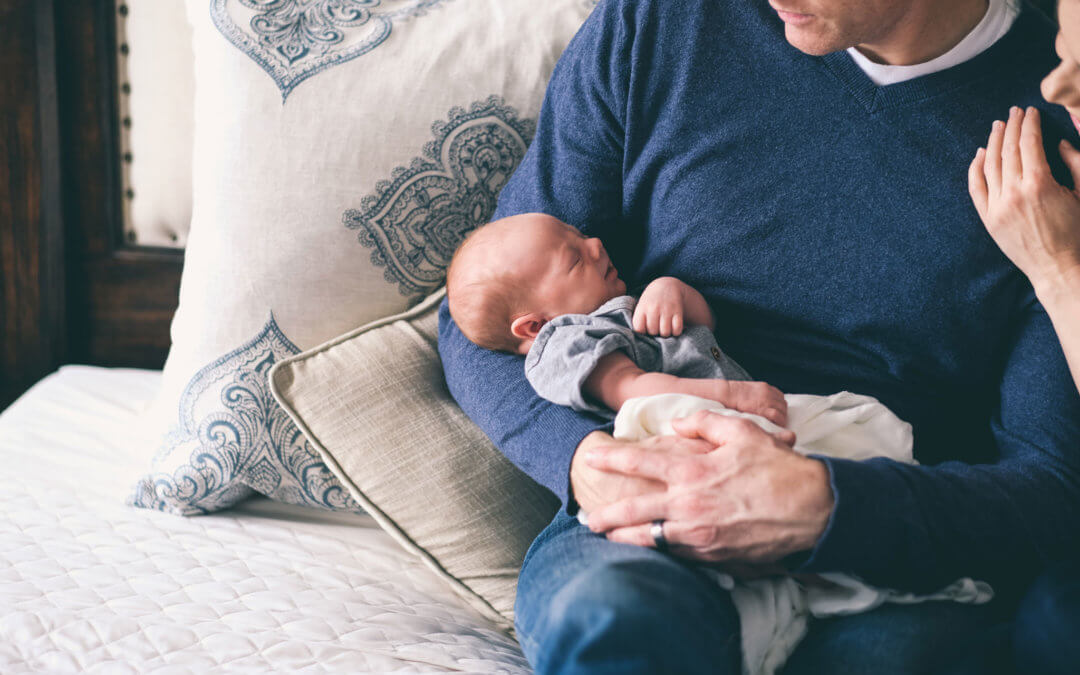“Are you getting any sleep?” It seemed like this was all people kept asking after I had my baby. A simple question, asked with a knowing smile. From me, it elicited a practiced tilt of the head, half-hearted chuckle, and some sleep-deprived witty comment back that delivered the message: of course not, but I’m cheerful about it.
It’s curious that in those fuzzy first days and weeks after baby comes, we feel the need to appear cheerful and normal. When visitors come, we try to greet them with makeup, our hair brushed, wearing something from the bottom of the drawer that doesn’t have baby throw up or breast milk stains on it. We tell people how happy we are to finally meet our little one and we minimize all of the thousand life changes that appeared overnight (quite literally).
But there’s one person we don’t minimize those changes to. One person who witnesses all of our ups and downs, all of the 3am feedings where we cry because we can’t remember when we last ate or slept or showered. One person who knows that even though we are so grateful and happy to have this tiny baby in our arms, we are still grieving the loss of the birth experience we really wanted. Even while we minimize to everyone else, our partner is alongside us for the ride.
In the spirit of May 2017 being Postpartum Depression Awareness Month in Michigan, let’s talk about postpartum depression. Partner, if you’re reading this, take notes. While your lady might put on some nice clothes and a pretty smile for everyone else, keep on the lookout for these things – and seek help if you spot them:
- Anxiety
- Feeling overwhelmed
- Guilt
- Irritability
- Crying
- Anger
- Sadness
- Brain fog or reduced concentration
- Numbness from emotions
- Difficulty sleeping
- Difficulty eating
- Feeling disconnected from one’s baby
- Experiencing frightening and intrusive thoughts
Risk Factors of Postpartum Depression
Remember that “postpartum” depression can pop up even during pregnancy. You can also be on alert for risk factors of postpartum depression:
- Previous experience of anxiety and/or depression
- Experiencing a stressful life event during pregnancy
- Experiencing a big life change during pregnancy (moving, change in job, change in roles within the home, etc.)
- Lacking social support
- History of sexual abuse or previous negative pregnancy/birth experiences
- A traumatic or unexpected birth experience
Marital Stress and Postpartum Depression
So how does this apply to your relationship with your partner? Well here’s what we know:
- The early postpartum period stresses relationships and lowers marital satisfaction for many couples. 83% of new parents experience moderate to severe levels of crisis during transition into parenthood (LeMasters, 1957). Marital quality decreases for 40% to 67% of couples during the first postpartum year (Shapiro, Gottman, & Carrere, 2000). Husbands of women with postpartum depression report less satisfaction in their marriage and feel less capable as parents (Zelkowitz & Milet, 1997).
- Marital distress and dissatisfaction predicts depression – and is a risk factor for postpartum depression. Women with postpartum depression feel less able to talk openly about problems with their partners than postpartum women who are not depressed (O’Hara, 1986). Marital distress predicted current and future depressive symptoms (Choi & Marks, 2008; Fincham, Beach, Harold, & Osborne, 1997).
We focus so much on our new baby in that early postpartum time that we don’t think about our relationship with our partner – and we need to.
Our partner is ideally our largest supporter and, unfortunately, sometimes our largest stressor. In the 24 months after our baby arrives, we face so many challenges as a unit. Sleep deprivation, changes in sexual arousal and desire, a shift in our roles within the home, a shift in our relationship with the world outside of our home, expectations and myths of motherhood and parenthood, changes in our relationships with friends, navigating a new list of priorities, and a complete reworking of all the big “meaning” and “purpose” questions in our life.
How do we protect and uphold the quality of our relationship during all of these challenges? How do we maintain a happy, satisfied relationship even when we, individually, might be struggling? How do we stay supportive of one another?
The answer from research, personal experience, and experience with my clients, seems to overwhelmingly be education and practice. If we can learn what is normal for the postpartum period and in parenthood, we can start to eliminate the negative effects of our unmet expectations for ourselves and our partners. If we can learn what good communication looks like, we open our relationship up to it. If we can practice being on the same team – fighting postpartum depression together, healing together, and communicating together – we feel supported. We feel stronger and we become stronger.
So if you noticed any of those postpartum depression signs, if you experienced or are experiencing any of the risk factors, if you are struggling with some of the changes in early parenthood, or if you are feeling disconnected from your partner – call us. Couples therapy is a safe place to navigate through these challenges with support and education. We’ve got your back and we can teach you how to get back to feeling like your partner has your back, too.

